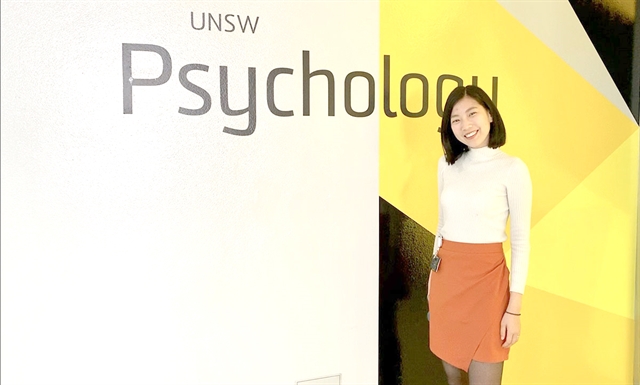 Inner Sanctum
Inner Sanctum

Having suffered from depression and pondered the lack of empathy that often surrounds mental health issues, Quang Thục Hảo, who is in her final year of earning a PhD in Psychology at Australia’s University of New South Wales, has turned her “ailment” into the subject of her doctoral thesis.

|
| LESSONS LEARNED: Quang Thục Hảo was among the top students in the Psychology Department at the HCM City University of Pedagogy. Photo courtesy of Quang Thục Hảo |
Having suffered from depression and pondered the lack of empathy that often surrounds mental health issues, Quang Thục Hảo, who is in her final year of earning a PhD in Psychology at Australia’s University of New South Wales, has turned her “ailment” into the subject of her doctoral thesis.
Quang Thục Hảo graduated near the top of her class at the Psychology Department of the HCM City University of Pedagogy in 2014, then earned a master’s degree in brain and mind science at the University of Sydney in Australia before securing a full scholarship to earn her PhD in Psychology at the University of New South Wales in Sydney. In Việt Nam, she won second prize at a major scientific research contest in 2012 and was presented Certificates of Merit by the Việt Nam Youth Union’s Central Committee.
Inner Sanctum: What made you decide to study psychology?
I remember I was in Grade 7 and doing well at school. I was given a coupon by the school to buy books at a bookstore. Stories of people’s journeys and experiences, successes, and failures absolutely fascinated me.
Unfortunately, when I was 15, I suffered a bout of depression after failing to gain entry into my preferred high school, in HCM City’s District 6, even though I was clearly a good student. Soon after I decided to pursue psychology as a field of study, because I wanted to better understand human feelings and emotions.
Inner Sanctum: That’s quite a young age to be depressed, isn’t it?
Now, as I reflect on those times, I can see that the failure that triggered my depression was a normal life event. But for a girl of 14 or 15, and dealing with the expectations of family, teachers, and friends, it was a major shock! My parents couldn’t believe I hadn’t gotten in to the school. I was embarrassed to face my parents and teachers. My closest “ally” at that time was my room, where I felt safe. I didn’t even want to eat.
It was a turning point in my life. Children also suffer from depression, not just adults. Many young people just don’t know who to share their feelings and emotions with.
It’s a common perception that only adults suffer from depression but I knew from personal experience that just wasn’t true. So I decided to study psychology and delve more deeply into the subject.
Inner Sanctum: What did you learn from your failure to gain entry into the high school?
I learned a great deal. Firstly, you must always aim to better yourself but you also need to take care of yourself. Your best effort is constantly required, regardless of past successes.
Secondly, you should be confident and try to discover as much about life as you can.
The experience equipped me with certain skills and led me to the study of psychology.
Inner Sanctum: You did indeed gain entry into the HCM City University of Pedagogy’s Psychology Department and was among the leading graduates. What was your secret?
I have a great passion for psychology studies and understand its importance.
I am quite patient and determined when I have goals. I came to understand that the past doesn’t determine the future if we make an effort in the present.
The classes piqued my interest from the outset, because I was making thought-provoking discoveries about human beings. How could someone from a humble background become a prominent celebrity? Why are some people still happy despite obvious pain? I had many questions.
But the path was not smooth. The more deeply I burrowed, the more complex I found the topic. Answering the question of “why?” doesn’t necessarily mean we need an answer. We must look at all of the different ways we can help others.
The opportunity to study in Australia also opened my eyes and I gained confidence as I learned about methods that were based on scientific evidence.
Inner Sanctum: What concerns you about the practice of psychology in Vietnam?
Generally speaking, the quality of research into and clinical practice of psychology in Việt Nam is in desperate need of renewal. One of my greatest concerns is having reliable psychological assessment tools that correspond to the social and cultural characteristics of the Vietnamese people. Such tools are few and far between in our country.
Inner Sanctum: And your PhD thesis has a focus on Việt Nam?
Yes. I have conducted research on the loss of motivation among people with physical injuries. Previous studies revealed that after people suffer trauma in some area of the brain, they begin to exhibit behavioural problems as well as physical limitations. But this field of study is still quite new in Vietnam. I would therefore like to identify how socio-cultural issues in Việt Nam can have an impact on a patient’s lack of motivation, and I hope this contributes to raising community awareness about such issues. Psychology has an impact on the recovery process. If patients lack motivation, the efforts of their family and healthcare providers will come to nothing.
Inner Sanctum: What are your plans for the future?
Firstly, I hope to find a good collaborative group and continue to develop clinical assessment tools for practice and research in Việt Nam. Secondly, I want to help the next generation to better understand the nature and application of psychology and access new trends based on science and evidence, thereby ensuring that practice and research in Việt Nam become more robust and resilient. - VNS




